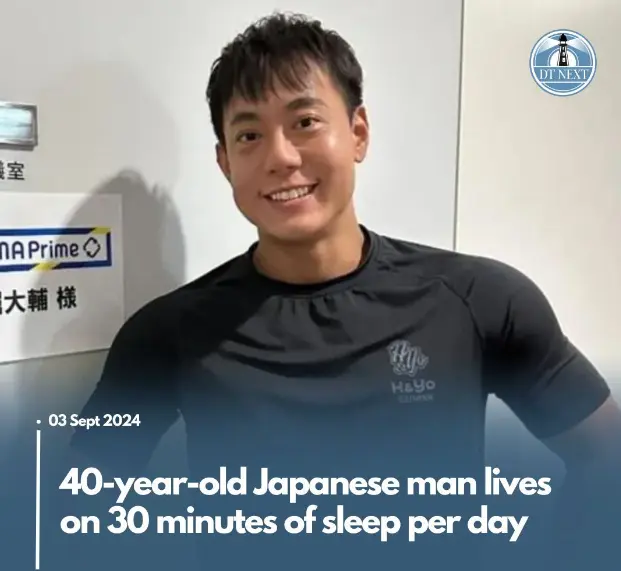A 40-year-old man from Hyogo prefecture, Japan, named Daisuke Hori, has reportedly slept only 30 minutes each day for the past 12 years. According to a report by the South China Morning Post, Hori believes this extreme sleep routine has helped him “double” his life.

Details:
- Name: Daisuke Hori
- Age: 40 years old
- Location: Hyogo prefecture, western Japan
- Sleep Pattern: 30 minutes of sleep per day
- Duration: 12 years
- Claim: Hori asserts that his unusual sleep schedule has increased his work efficiency and allowed him to lead a more productive life.
- Purpose: He trained his body and brain to function normally on minimal sleep, aiming to extend his life.
Sleep Practice:
- Sleep Routine: For the past 12 years, Hori has adhered to a sleep schedule of only 30 minutes per day.
- Method: The exact details of his method for training his body and brain to function with minimal sleep are not extensively documented. Generally, people who attempt extreme sleep schedules might use techniques such as polyphasic sleep, sleep training, and cognitive techniques to minimize the negative impacts of sleep deprivation.
3. Claims and Beliefs:
- Life Extension: Hori claims that his practice of minimal sleep has helped him “double” his life, meaning he believes it has significantly extended his lifespan or allowed him to be more productive.
- Improved Efficiency: He asserts that his ability to function and be efficient at work has improved, attributing this to his unusual sleep schedule.
4. Training and Adaptation:
- Body and Brain Training: Adapting to such a minimal amount of sleep typically involves rigorous training. This can include:
- Gradual Adjustment: Slowly reducing sleep duration to help the body and mind adjust.
- Cognitive Techniques: Using mental exercises to stay alert and maintain focus.
- Health Monitoring: Regularly monitoring physical health to manage potential negative effects such as cognitive impairment or health issues.
5. Scientific and Health Perspectives:
- General Consensus: Mainstream medical and scientific communities generally advise against extreme sleep reduction due to well-documented risks including cognitive decline, weakened immune function, and increased risk of various health conditions.
- Personal Variation: While some individuals claim to adapt to very short sleep schedules, these cases are rare and often lack long-term scientific validation.
6. Public and Media Attention:
- Reporting: The South China Morning Post has reported on Hori’s unique sleep schedule. However, detailed investigations into his daily life, health status, or validation of his claims are limited.
Summary:
Daisuke Hori is a Japanese man who has reportedly been sleeping only 30 minutes a day for 12 years. He believes this practice has extended his life and improved his efficiency at work. While this claim is intriguing, it contrasts with general scientific understanding of sleep needs and health. Comprehensive details about his specific methods and the full impact on his health are not widely available.
Potential Health Risks of Extreme Sleep Deprivation
Adopting an extreme sleep schedule, such as sleeping only 30 minutes a day, can have severe and potentially detrimental effects on human health. The human body requires a certain amount of restorative sleep to maintain optimal function, and significantly reducing sleep duration can disrupt this balance.
Chronic sleep deprivation is associated with a range of health issues, including impaired cognitive function, which can lead to difficulties with memory, attention, and decision-making. Additionally, sleep deprivation can weaken the immune system, making the body more susceptible to infections and illnesses.
Over time, it can also increase the risk of developing serious conditions such as cardiovascular disease, hypertension, and diabetes, as the body’s ability to regulate blood pressure, glucose levels, and overall cardiovascular health is compromised. Moreover, extreme sleep deprivation can exacerbate mental health issues, including anxiety and depression, due to its impact on mood regulation and stress response.
The lack of sufficient restorative sleep can also contribute to physical problems like weight gain and obesity, as sleep is crucial for metabolic processes and appetite regulation. In summary, while some individuals may claim to adapt to minimal sleep, the overwhelming consensus in the medical community is that drastically reducing sleep can have severe and far-reaching negative effects on both physical and mental health.